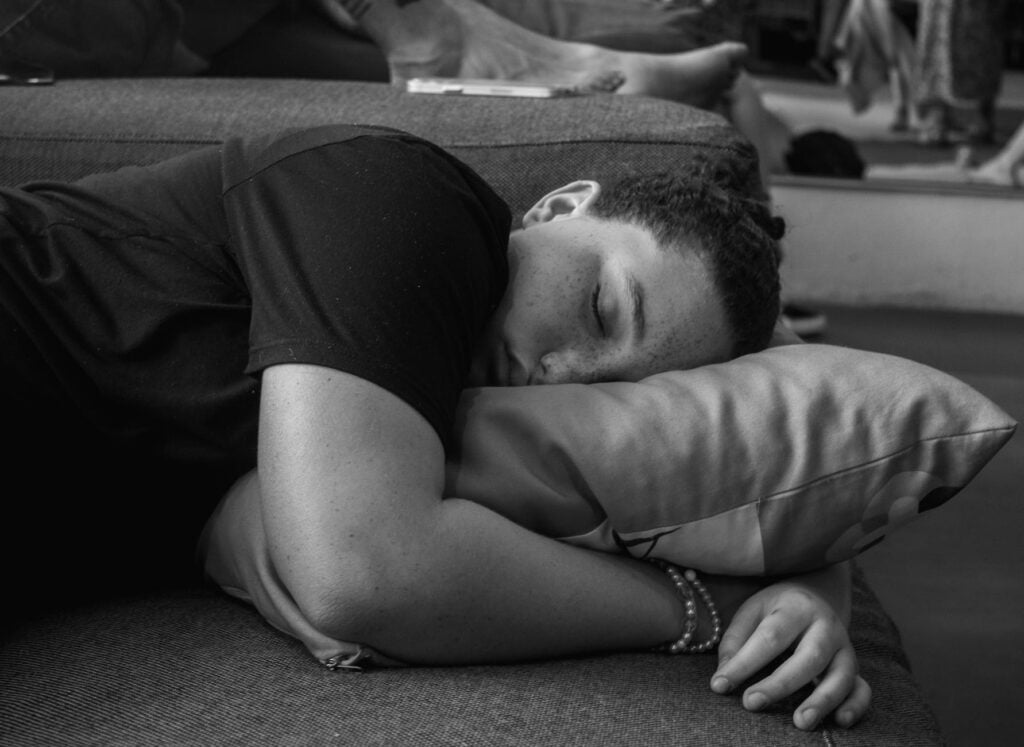Understanding Sleep Paralysis: A Comprehensive Guide on Causes, Symptoms and Management

Sleep paralysis can be a terrifying experience, but understanding what causes it can help ease the fear!
Have you ever woken up and found that you can’t move or speak, even though you’re fully awake? This scary and mysterious experience is known as sleep paralysis. It’s a peculiar and often frightening phenomenon that occurs at the intersection of wakefulness and sleep.
What is Sleep Paralysis?
Sleep paralysis is a type of sleep disorder that happens just as you’re falling asleep or waking up. During these moments, you’re conscious but unable to move or speak. This can last from a few seconds to a few minutes. It’s like your brain is awake, but your body hasn’t caught up yet.
Symptoms: More Than Just Paralysis
The main symptom of sleep paralysis is being unable to move or speak while falling asleep or upon waking. But there’s more:
- Hallucinations: Many people see or hear things that aren’t there. These can be scary and seem very real. You might feel pressure on your chest or have a sense of an evil presence in the room.
- Breathing Difficulty: Some people feel a tightness in their chest, making it hard to breathe.
- Fear and Anxiety: Because you’re unable to move, it’s common to feel scared or panicked during an episode.
What Causes Sleep Paralysis?
Sleep paralysis is all about timing. It occurs during the REM (Rapid Eye Movement) phase of sleep. This is the dream part of our sleep cycle, where our brain is very active, but our muscles are relaxed to prevent us from acting out our dreams. Sometimes, if we wake up before REM sleep is finished, we become aware before our body stops being relaxed – that’s sleep paralysis.
Who Experiences Sleep Paralysis?
Sleep paralysis can happen to anyone, but it’s more common in:
- Teenagers and Young Adults: Changes in sleep patterns and stress can trigger it.
- People with Irregular Sleep Schedules: If you often change when you go to bed or don’t get enough sleep, you might experience sleep paralysis.
- Individuals with Mental Health Issues: Conditions like stress, anxiety, or depression are linked to sleep paralysis.
- Family History: If other people in your family have had it, you might be more likely to have it too.
- People with Another Sleep Disorder: Conditions like narcolepsy (excessive daytime sleepiness), circadian rhythm disorders, sleep apnea, or chronic insomnia are more likely to have sleep paralysis.
Is Sleep Paralysis Dangerous?
In most cases, sleep paralysis is not dangerous. It doesn’t cause physical harm or long-term health complications. However, it can feel intensely frightening, especially when accompanied by hallucinations or a sense of pressure on the chest. This fear response can trigger anxiety and make sleep feel unsafe, particularly if episodes become frequent.
How to Prevent?
If you experience sleep paralysis often, there are ways to reduce its frequency:
- Regular Sleep Schedule: Try to go to bed and wake up at the same time every day.
- Create a Restful Environment: Make your bedroom a calm and comfortable place. Avoid screens before bed, and try to keep the room dark and cool.
- Manage Stress: Activities like yoga, meditation, and deep breathing can help reduce stress.
- Certain Substances: Caffeine, alcohol, heavy meals right before bed, or recreational substances can disrupt sleep.
How to Get Out of Sleep Paralysis?
If you find yourself in sleep paralysis, here’s what you can do:
- Stay Calm: Remember, it’s temporary and not dangerous.
- Focus on Small Movements: Try to wiggle your toes, fingers, or facial muscles.
- Breathing: Concentrate on steady, deep breaths to help stay calm.
- Changing Sleep Positions: If you often get sleep paralysis in the same position (such as on your back), try sleeping differently.
Explore more in detail: How to Wake Up from Sleep Paralysis: 7 Expert Techniques
When to Seek Help?
If sleep paralysis is frequent and affects your sleep quality, or if you feel anxious about going to sleep, it’s a good idea to talk to a doctor. They can help determine if there’s an underlying cause and provide guidance on treatment options. You should consider reaching out to a sleep therapist or healthcare provider if:
- You experience sleep paralysis more than once a week
- Episodes include vivid or frightening hallucinations
- You’re feeling anxious or afraid of going to sleep
- It’s affecting your mood, focus, or daytime energy
- You also have snoring or breathing issues during sleep (which could signal sleep apnea)
Persistent or distressing sleep paralysis can sometimes be linked to underlying conditions like insomnia, PTSD, anxiety, or narcolepsy. A trained professional can help uncover the root causes and offer tools to reduce the frequency and intensity of episodes.
Conclusion
Sleep paralysis can be a frightening experience, but understanding what it is and how to manage it can make a big difference. It’s a common occurrence and, for most people, a rare and harmless part of the sleep cycle.
By maintaining good sleep habits and a healthy lifestyle, you can reduce the likelihood of experiencing sleep paralysis and ensure a good night’s sleep. Remember, just like a vivid dream, it’s a passing experience and not a danger to your well-being.
Ready to Transform Your Sleep?
If you’re seeking a deeper understanding of your sleep patterns or looking for personalized strategies to improve your sleep quality, get a free sleep consultation now. We are here to help!
We provide support and treatment for chronic sleep difficulties through assessment and sleep therapy for people in British Columbia, Ontario, and online consultation and sleep health education globally.
References
American Academy of Sleep Medicine: Understanding Sleep Paralysis
National Health Service (NHS) UK: Sleep Paralysis
